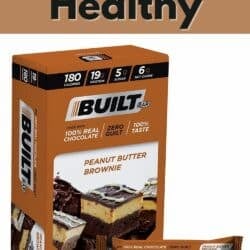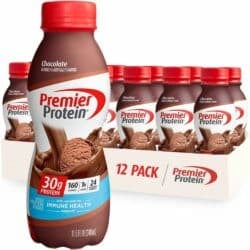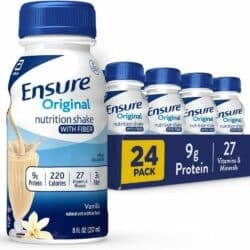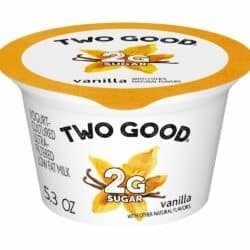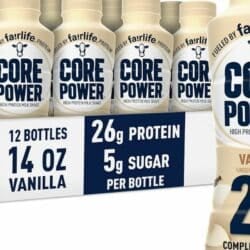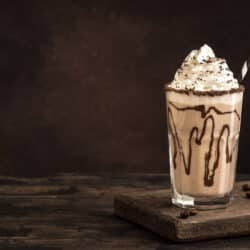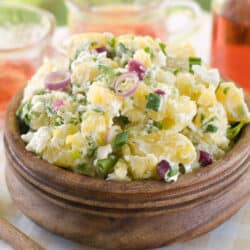Are Built Bars Good For You (From a Nutritionist)?
In this blog post, I’ll review the question of whether Built Bars are good for you or not? Find out this product’s nutrition pros and cons, plus some better options to consider for a healthy diet. As a nutritionist, I do not consider this product to be good for you because it contains highly processed ingredients and allergens.
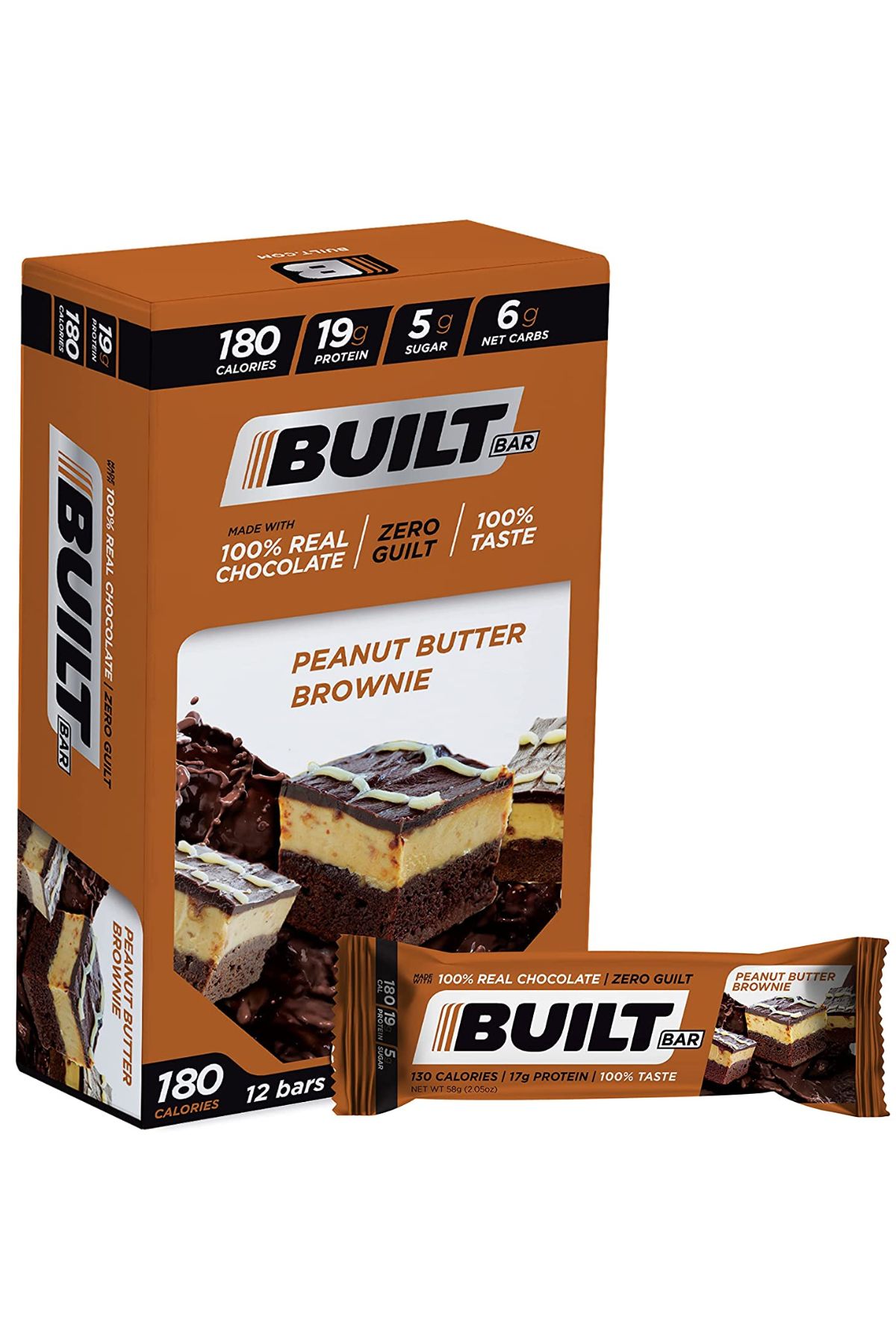
Built Bars Facts
Built Bars are low-calorie, gluten-free, low-fat protein bars with low sugar and high fiber content.
They are manufactured by Built Brands, launched in 2018 by Nick Greer. The goal of creating Built Bars was to create a protein bar that tastes better than most other options but is also healthier than other commercial protein bars. As such, the company promotes Built Bars as a healthy alternative to a candy bar.
Only available online in boxes containing at least 12 bars, Built Bars come in various flavors including:
- Cookies’ n Cream
- Coconut
- Salted Caramel
- Double Chocolate
- Peanut Butter Brownie
- Coconut Almond
- Cherry Barcia
- Mint Brownie
- Raspberry
You can buy a single flavor or a mixed box for a variety. They are available online or at your local grocery store.
Built Brands also sells marshmallow puff bars and granola bars.
Built Bar Ingredients
Depending on the flavor, Built Bars contain a variety of ingredients. Some flavors include nuts, and others are nut-free.
Most bars contain partially hydrolyzed whey protein isolate, cocoa butter, sugar, chocolate liquor, soy lecithin, vanilla, gelatin, glycerin, maltodextrin, erythritol, natural flavor, and citric acid.
Some flavors of Built Bars contain tree and ground nuts and dry milk.
The Cookies and Cream Built Bar ingredients includes:
- Protein Blend (Whey Protein Isolate)
- Dark Chocolate (Chocolate Liquor, Erythritol, Inulin, Cocoa Butter, Milk Fat, Soy Lecithin, Natural Flavor, Stevia)
- Water
- Glycerin
- Gelatin
- Erythritol
- Cocoa Powder (Processed with Alkali)
- Natural Flavors
- Inulin
- Maltodextrin
- Salt
- Stevia Glycosides (Stevia)
- Citric Acid
Let’s look further at some of the main ingredients in Built Bars and what it potentially means for your health.
Whey Protein Isolate
Each Built Bar contains between 17g and 19g of protein derived from partially hydrolyzed whey protein isolate. Protein is an essential macronutrient that helps our bodies with muscle growth and repair.
Whey protein is the main ingredient in Built Bars. It is derived from cow’s milk and is one of the most common protein supplements.
Partially hydrolyzed whey protein isolate is the most refined and highly processed form of whey protein. Because of this ingredient, and others, Built Bars are not vegan or appropriate for people avoiding milk or dairy products.
If you want to avoid consuming processed foods or foods containing dairy or animal products, many real food protein options are available as a great option.
Gelatin
Gelatin is also an animal product and therefore not vegan. But, gelatin could be considered one of the healthier ingredients in Built Bars.
Gelatin is a naturally occurring protein derived from the collagen in animal skin, bones, and cartilage. Collagen is essential for joint health.
Gelatin has many health properties. It helps boost collagen, which improves skin elasticity, and is excellent for healthy bones because of the lysine it contains. It can also assist with improved digestion, enhance the quality of sleep, and even help with weight loss.
Ideally, you would consume gelatin from grass-fed, organic animals. It is unlikely that the gelatin used in Built Bars comes from such animals. So, it’s your own personal preference if you want to get gelatin from Built Bars or from a more trusted source (see my related article on the potential side effects of gelatin).
Soy Lecithin
Soy and soy lecithin are not the same things.
Soy is a plant protein that is high in protein. It’s also a controversial ingredient for various reasons, including that most of the soy produced in the U.S. is genetically modified and may alter thyroid function in people lacking iodine.
Soy lecithin is derived from soy oil that’s been highly processed. It contains practically no soy protein and is so processed that it’s completely different from actual soy. It’s so ultra-processed and altered that people with a soy allergy can usually consume it safely.
Because soy lecithin is highly processed and may have been extracted with dangerous solvents like hexane, it should not be considered a healthy ingredient.
Maltodextrin
Maltodextrin is a carbohydrate used to improve the texture of foods. It’s a processed ingredient from rice, corn, wheat, or potatoes.
Although the FDA considers maltodextrin a safe food additive, it has an even higher glycemic index than sugar. This means that it can cause a sharp spike in blood sugar which can cause health problems and even be dangerous for people with insulin resistance or diabetes.
Maltodextrin may not be 100% safe for people with certain autoimmune diseases or stomach problems like Coeliac or Crohn’s disease.
It can contain traces of gluten, so some people with coeliac may experience digestive issues when they consume this ingredient. This study may link maltodextrin with developing Crohn’s disease.
Erythritol
Erythritol is a sugar alcohol like xylitol, mannitol, and sorbitol. It is a by-product of fermented cheese, beer, wine, and other foods. Erythritol has no nutritional value, calories, or effect on glucose or insulin levels.
However, research shows that sugar alcohols can cause digestive problems like stomach cramps, gas, and diarrhea.
Some people tend to be more sensitive to sugar alcohols than others, but it’s worth noting the risk and that this is a processed product, even though it’s derived from natural foods and helps reduce the need for added sugars.
Nutrition Pros
Built Bars contain protein, so they can help you feel fuller for longer. They are gluten-free, trans-fat-free, and low in calories.
For people with nut allergies, there are nut-free options to choose from in different flavors.
Since some of the other commercial protein bars contain high quantities of sugar, fat, and calories, Built Bars can be attractive for people who feel they need protein bars but want to be more health conscious.
Nutrition Cons
Built Bars are highly processed and contain dairy and soy, two common allergens. Some flavors, like the peanut butter brownie and coconut almond, contain ground nuts, tree nuts, or both, so they are unsuitable for people with a nut allergy.
I prefer products and bars made with beef protein isolate as a much cleaner source of nutrition.
These popular protein bars are sweetened with added sugar and erythritol, a sugar alcohol that can cause various digestive problems.
Instead of buying a highly processed product like Built Bars, making your own protein bars at home with real food natural ingredients is always better.
That said, eating a typical protein as a snack or meal replacement every once in awhile is not likely to affect your health too much, assuming you aren’t allergic to any of the ingredients.
Built Bar Nutrition FAQs
Built Bars are highly processed snacks made in a factory. They contain ingredients that may not be suitable for people with dietary restrictions.
Although these bars are gluten-free, they are not dairy-free or sugar-free and unsuitable for vegans or people who are lactose intolerant. See my list of gluten and dairy free snacks.
You would be better off in terms of health benefits by making a healthy homemade protein bar using non-processed, real food ingredients. The best protein bar would have at least 10 grams of protein and would include ingredients such as: nuts, seeds, dates or other natural ingredients. Try adding protein powder from my list of clean protein powders that you could include.
Yes, you can. You can use healthy, unprocessed ingredients to make delicious protein bars at home in various flavors. See this recipe for a homemade protein bar. Or, try my recipe for dairy-free protein coffee.
Making homemade food also gives you control over ingredients, so you can adapt the bars to dietary needs, for example, making it dairy-free or sugar-free. See my related article, “Are Kind Bars Healthy?“
No, they can’t. All Built Bars contain whey protein, which is a milk by-product. They also contain fat-free milk and gelatin, which is an animal by-product.
Both of these bars have similar protein content and are made with similar ingredients with similar nutrition facts. They are both highly processed foods. See my related review, “Are Quest Protein Bars Healthy?“
More Product Reviews You Might Like
Conclusions
Built Bars may be a better choice than some of the other protein bars on the market, but they are not necessarily a healthy snack for people who follow a clean diet based around healthy food. These bars are gluten-free and low in fat and calories but contain various highly processed ingredients and allergens. If you love protein bars, making a healthier version at home with real food ingredients is best.
I hope you enjoyed this Built Bar review. Let me know your thoughts in the comments!
Don’t forget to join my newsletter list to get exclusive clean eating recipes and tips. The newsletter is 100% free with no spam; unsubscribe anytime.
About the Author: Carrie Forrest has a master’s degree in public health with a specialty in nutrition and is a certified holistic nutritionist. She is a top wellness and food blogger with over 5 million annual visitors to her site. Carrie has an incredible story of recovery from chronic illness and is passionate about helping other women transform their health. Send her a message through her contact form.
Note: this post is for informational purposes only and is not intended as medical advice. Please consult your healthcare provider for recommendations related to your individual situation.


